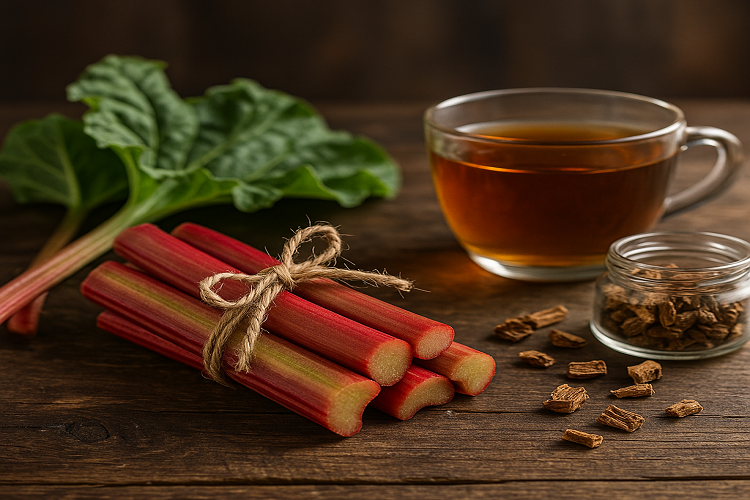
Using Rhubarb for Constipation: Nature’s Tangy Little Helper
When you hear the word rhubarb, chances are your mind jumps to pies, jams, or that tart pink stalk peeking out at farmers markets every spring. But beneath its charming, old-fashioned reputation, rhubarb has quietly earned a place in the world of natural medicine especially as a time-tested remedy for one of life’s most uncomfortable troubles: constipation.
Before you grab a fistful of stalks or dive into grandma’s cobbler recipe for “medicinal purposes,” let’s unpack how rhubarb works, its history, what modern science says, and how to use it safely and effectively.
A Brief History: Rhubarb as Medicine
Rhubarb’s journey starts not in the kitchen, but in ancient apothecaries.
For over 2,000 years, Chinese rhubarb (Rheum palmatum and Rheum officinale) has been a prized herb in Traditional Chinese Medicine (TCM), known as Da Huang literally “big yellow.” Used as a laxative, detoxifier, and blood mover, rhubarb root was prescribed to treat constipation, digestive sluggishness, and even infections.
By the Middle Ages, rhubarb made its way along the Silk Road to Europe, where it was considered so valuable it once rivaled the price of cinnamon and saffron.
The rhubarb we toss into pies today (Rheum rhabarbarum) is related to medicinal varieties but typically less potent. Still, its use as a natural aid for sluggish digestion endures.
How Does Rhubarb Work as a Laxative?
Rhubarb is a fascinating little plant because it contains two opposing forces in its stalks and roots:
- Anthraquinones (like sennosides and emodin) powerful laxative compounds that stimulate bowel contractions and increase water secretion in the intestines.
- Tannins astringent compounds that tighten and firm tissue, which can have a mild constipating or binding effect.
Here’s the magic:
In small doses, the tannins in rhubarb can help with diarrhea by tightening things up. In larger doses, the anthraquinones win out, producing a gentle or not-so-gentle laxative effect.
The Scientific Perspective
Modern research has confirmed many of rhubarb’s traditional uses:
- Mild laxative effect: Studies suggest rhubarb extracts can stimulate intestinal movement and relieve constipation, especially in elderly or hospitalized patients.
- Gut health: Rhubarb has shown promise in improving intestinal barrier function, potentially helping with gut inflammation and protecting the delicate gut lining.
- Antimicrobial properties: Rhubarb’s anthraquinones can inhibit certain bacteria and fungi, though this is still an emerging field of research.
However, dosage matters, and more is not always better too much rhubarb can cause cramping, diarrhea, and even electrolyte imbalance.
How to Use Rhubarb for Constipation
Important note: We’re talking here about medicinal use, not just eating a slice of rhubarb pie (sorry although pie can lift the spirits, its laxative effect is probably minimal!).
Here are common approaches:
1. Medicinal Rhubarb Extracts
Available in capsules, tinctures, or powders made from dried rhubarb root. These are standardized for consistent dosing.
- Start with a low dose and follow product instructions.
- Typically used at bedtime to encourage a morning bowel movement.
2. Rhubarb Herbal Teas
Some herbal laxative teas combine rhubarb root with other digestive herbs like senna, ginger, or licorice.
- Steep according to package directions.
- Limit use to occasional, short-term relief not daily long-term use.
3. Culinary Rhubarb (Cooked Stalks)
While much milder, eating stewed rhubarb or adding it to smoothies can gently encourage digestion thanks to its fiber and small amounts of anthraquinones.
- Combine with honey or strawberries to balance its tartness.
- Never eat rhubarb leaves they are toxic and should not be consumed.
Safety Tips and Precautions
✅ Use medicinal rhubarb occasionally, not as a daily habit. Long-term use can cause dependence, weaken bowel function, and disturb electrolytes.
✅ Avoid if pregnant or breastfeedinganthraquinones can stimulate uterine contractions and may pass into breast milk.
✅ Watch for signs of overuse: diarrhea, abdominal cramping, electrolyte imbalances (weakness, irregular heartbeat, confusion).
✅ Consult your doctor if you have heart, kidney, or gastrointestinal conditions, or if you’re taking medications like diuretics or blood thinners.
✅ Never use rhubarb leaves they contain oxalates, which can cause serious poisoning.
When to See a Doctor
Natural remedies like rhubarb can be a helpful nudge when you’re dealing with occasional constipation. But if you have:
- Severe, ongoing constipation
- Unexplained weight loss
- Blood in the stool
- Severe abdominal pain
Don’t rely on home remedies see your healthcare provider right away.
Fun Rhubarb Facts to Impress Your Friends
- Rhubarb’s nickname is “pie plant” but it was a medicine long before it hit dessert menus.
- The leaves are poisonous because of their high oxalate content, so only the stalks are eaten.
- Rhubarb was once so prized that in 17th-century Europe, it was more expensive than opium.
- It grows brilliantly in space-saving gardens and survives tough winters a symbol of resilience!
Other Natural Allies for Constipation
If rhubarb isn’t your thing or you want to mix up your remedies:
- Prunes or prune juice
- Psyllium husk
- Ground flaxseeds
- Kiwi fruit
- Magnesium citrate
- Plenty of water and regular exercise
Nature’s Tangy Laxative (Handle with Care)
Rhubarb, with its history rooted in ancient medicine and its place in modern gardens, offers a gentle and natural option for occasional constipation relief. Whether through a supplement, a tea, or a bowl of stewed rhubarb, this quirky plant reminds us that nature often packs more punch than we realize.
But like all remedies, the key is respectful use not overdoing it, not relying on it daily, and always paying attention to your body’s signals.
So, the next time you see those magenta stalks at the market or pull them from your backyard patch, remember beneath their tart charm lies a time-tested ally, waiting to help when your digestion needs a little nudge.

